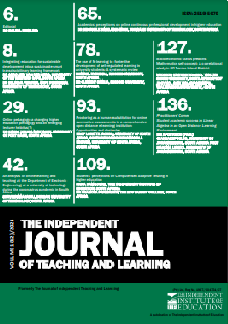Student Academic Success in Linear Algebra in an Open Distance Learning Environment
DOI:
https://doi.org/10.17159/ijtl.v18i2.17325Keywords:
Linear Algebra, ODeL, types of knowledge, mathematics content knowledge, procedural knowledge, conceptual knowledgeAbstract
Academic success in first year university mathematics in been problematic for decades and mathematics educators keep looking for the causes. What has been universally agreed, is that the theoretical and abstract nature of mathematics plays a role. A module on Linear Algebra at an Open Distance eLearning (ODeL) institution, was identified for investigation due to very high dropout and failure rates. This article concentrates on identifying the types of knowledge (e.g., procedural, conceptual, strategic, schematic and declarative) necessary for academic success in the subject. Using the literature, a conceptual framework is developed to classify students’ answers into the various types of knowledge. The research question asks what types of knowledge contributes to academic success in Linear Algebra. Script analysis is used to answer the research question. The results showed that lack of the necessary declarative knowledge which forms the basis for the other forms of knowledge as well as procedural knowledge were the main causes of the resulting misconceptions and errors. It was established that students were more engaged in surface learning rather than deep learning that results in conceptual understanding and acquisition of conceptual knowledge.
References
Babbie, E. & Mouton, J. (2011) The Practice of Social Research. Cape Town: Oxford University Press Southern Africa.
Bloom, B.S. (1979) Taxonomy of educational objectives. Book 1. New York. McGraw-Hill, inc.
Britton, S. & Henderson, J. (2009) Linear algebra revisited: An attempt to understand students' conceptual difficulties. International Journal of Mathematical Education in Science and Technology 40(7) pp.963-974, doi:10.1080/00207390903206114 DOI: https://doi.org/10.1080/00207390903206114
Çelik, D. (2015) Investigating Students’ Modes of Thinking in Linear Algebra: The Case of Linear Independence. International Journal for Mathematics Teaching and Learning 3(1) pp.1-20.
Dorier, J.L. & Sierspinska, A. (2002) Research into the teaching and learning of Linear Algebra. In D. Holton (Ed.) The teaching and learning of Mathematics at university level. New ICMI Study. Dordrecht: Kluwer Academic Publishers, pp.255-273. DOI: https://doi.org/10.1007/0-306-47231-7_24
Dorier, H-L (Ed.) (2002) On the teaching of Linear Algebra. Dordrecht: Kluwer Academic Publishers. DOI: https://doi.org/10.1007/0-306-47224-4
Donevska-Todorova, A. (2014) Three modes of description and thinking of Linear Algebra concepts at the upper secondary education, https://eldorado.tu-dortmund.de/bitstream/2003/33447/1/BzMU14-4ES-Donevska-Todorova-55.pdf (Accessed 28 June 2023).
Ferryansyah, E., Widyawati. & Rahayu, S.W. et al. (2018) The analysis of students’ difficulty in learning Linear Algebra. Journal of Physics: Conference series 1028 012152, doi: 10.1088/1742-6596/1028/1/012152 DOI: https://doi.org/10.1088/1742-6596/1028/1/012152
Giannakopoulos, A. (2017) Performance of Grade 12 Learners in Geometry. Proceedings of the 23rd AMESA conference, Nelson Metropolitan University, Port Elizabeth, South Africa.
Hiebert, J. & Lefevre, P. (1986) Conceptual and procedural knowledge in mathematics. Hillsdale, NJ: Laurence Erlbaum Associates.
Hillel, J. (2000) Modes of descriptions and problem of representation in Linear Algebra. In J-L. Dorier (Ed.), On the teaching of Linear Algebra. Dordrecht: Kluwer Academic Publishers, pp.209-246.
Krathwohl, D.R. (2002) A revision of Bloom’s taxonomy: An overview. Theory into practice 41(4) pp.212-218. DOI: https://doi.org/10.1207/s15430421tip4104_2
Luneta, K. (2015) Understanding students’ misconceptions: An analysis of final Grade 12 examination questions in geometry. Pythagoras 36(1) pp.1-11. DOI: https://doi.org/10.4102/pythagoras.v36i1.261
Murray, J. (2013) The Factors that Influence Mathematics Achievement at the Berbice Campus. International Journal of Business and Social Science 4(10) pp.150-164.
Orhun, N. (2012) The Relationship Between Learning Styles and Achievement on Linear Algebra Course. Procedia-Social and Behavioral Sciences 47 pp.638-642. DOI: https://doi.org/10.1016/j.sbspro.2012.06.710
Rensaa, R.J. & Vos, P (2018) Interpreting teaching for conceptual and for procedural knowledge in a teaching video about linear algebra. Skrifter från Svensk förening för matematikdidaktisk forskning, pp.109-118.
Rittle-Johnson, B. & Schneider, M. (2015) Developing conceptual and procedural knowledge of mathematics. In R. Cohen Kadosh & A. Dowker (Eds.) Oxford handbook of numerical cognition. Oxford: Oxford University Press. DOI: https://doi.org/10.1093/oxfordhb/9780199642342.013.014
Robert, K. (2017). Factors Influencing Students’ Academic Achievement in Linear Algebra. International Journal of Education and Evaluation 3(3) pp.18-23.
Shavelson, R.J., Ruiz-Primo, M.A. & Wiley, E.W. (2005) Windows into the wind. Higher Education 49 pp.413-430. DOI: https://doi.org/10.1007/s10734-004-9448-9
Sierpinska, A. (2000) On some aspects of students’ thinking in Linear Algebra. In J-L. Dorier (Ed.), On the teaching of Linear Algebra. Dordrecht: Kluwer Academic Publishers, pp.209-246. DOI: https://doi.org/10.1007/0-306-47224-4_8
Skemp, R. R. (1987) The psychology of learning mathematics. London: Lawrence Erlbaum Associates.
Soylu, A. & Işik, A. (2008) Teaching Linear Algebra: Conceptual and Procedural Learning in Linear Transformation. Educational Research Journal 23(2) pp.203-226.
Wang, Q. (2016) Bridging the gap between declarative knowledge and procedural knowledge through metalinguistic corrective feedback. https://hdl.handle.net/2144/14568. (Accessed 10 January 2019).
Wood, L.N., Smith, G.H., Petocz, P. & Reid, A. (2002) Correlation between student performance in Linear Algebra and categories of a taxonomy. In 2nd International Conference on the Teaching of Mathematics (at the undergraduate level). Crete, Greece: John Wiley & Sons.







.png)